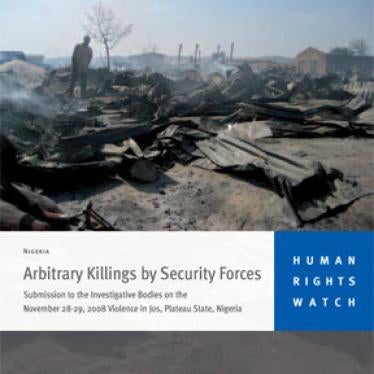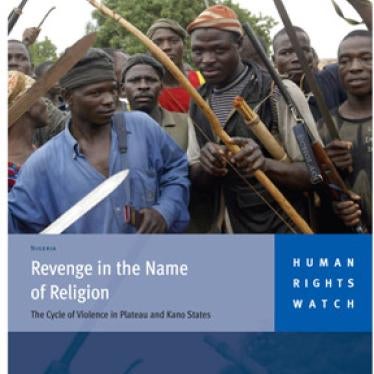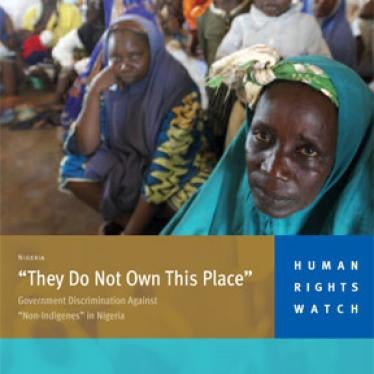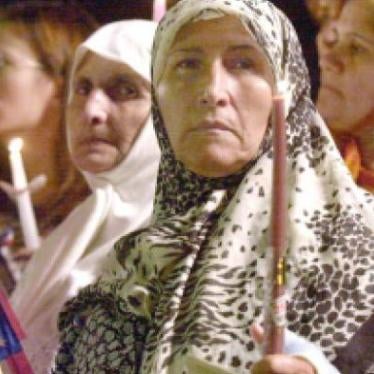Thank you, Chairman Franks and Members of the Caucus, for inviting Human Rights Watch to participate in this hearing. My name is Eric Guttschuss and I am the Nigeria researcher at Human Rights Watch. We very much welcome a discussion on the root causes of sectarian violence in Nigeria, which has shattered the lives of thousands of Nigerians, both Christians and Muslims.
Inter-communal, political, and sectarian violence have claimed the lives of more than 13,000 people during the past 10 years in Nigeria. Human Rights Watch has conducted investigations into the most serious outbreaks of inter-communal violence during this period, including sectarian clashes that left hundreds dead, respectively, in Kaduna in 2000 and 2002, Kano in 2004, and Plateau State in 2001, 2004, and 2008.
This past year was particularly deadly: In November 2008, more than 700 people were killed during two days of inter-communal violence in Jos, the capital of Plateau State in central Nigeria. Eight months later, in July 2009, at least 800 people were killed in northern Nigeria during violent clashes between government security forces and an Islamist group known as Boko Haram. Members of the Boko Haram group are also reported to have burned churches and attacked and killed Christians during these clashes.
Although religious identity and extremist beliefs are often cited as factors contributing to inter-communal violence in Nigeria, many of these clashes are in reality more rooted in political and economic tensions. Longstanding battles for control of political power and economic rivalries between various ethnic groups often underlie this violence. As poverty and unemployment have become more widespread and severe due to endemic government corruption and mismanagement, competition has intensified dramatically for scarce opportunities to secure government jobs, education, and political patronage.
These tensions have been further exacerbated by government policies that discriminate against "non-indigenes" - people who cannot trace their ancestry to what are said to be the original inhabitants of an area. Non-indigenes are openly denied the right to compete for state and local government jobs and are subject to discriminatory admissions policies at state-run universities - thus denying them access to some of the most important avenues of socio-economic mobility. The discriminatory policies of state and local governments have effectively relegated millions of Nigerians - Christian and Muslim alike - to the status of second-class citizens in their place of residence.
Political and ethnic divides often coincide with the religious divide. As grievances build up and levels of poverty intensify over time, religious sentiment is exploited by political and community leaders. This in turn inflames the situation to a level where it can eventually no longer be controlled. Encouraged by the impunity that has protected those responsible for similar outbreaks of violence in the past, individuals who carry out these killings, and those who organize them, are emboldened by the knowledge that they will likely not be held accountable for their actions.
I would like to talk briefly about the most recent example of this dynamic: The November 28-29, 2008 sectarian violence in Jos. In December 2008 and February 2009, I carried out three weeks of in-depth field research into the root causes and consequences of this violence. The two days of sectarian clashes followed a disputed local government election in Jos. The violence pitted predominantly Christian "indigenes" from the Berom, Afizere, and Anaguta ethnic groups, who largely supported the Christian candidate from the ruling party, against Muslim "non-indigenes," primarily from the Hausa-Fulani ethnic group, who largely backed the Muslim candidate from one of the leading opposition parties. At stake in the local government election was not just political control of an important local government seat, but also control over determining which ethnic groups would be granted the benefit of indigene status in Jos. Local governments throughout Nigeria have the discretion to determine which ethnic groups are designated as indigenes in their communities.
What began as violence between supporters of opposing political parties in Jos soon escalated to a conflict drawn on religious and ethnic lines. As the violence spread, people were simply targeted and killed on the basis of their religion or ethnicity.
Witnesses described to me how mobs of Muslims beat, burned, or bludgeoned to death Christians, in some cases specifically targeting Christian pastors. Church officials in Jos reported that 129 Christians were killed during the violence - including seven pastors and church leaders - and 46 churches and hundreds of Christian homes were burned by Muslim mobs.
Muslim witnesses and victims likewise described how mobs of Christians set ablaze or destroyed 22 mosques, 15 Islamic schools, and hundreds of Muslim homes and businesses. In one such case, witnesses described to me how a mob of Christians attacked the Al Bayan Islamic boarding school on the morning of November 28, killing five children in or near their dorm rooms. Muslim authorities in Jos reported that 632 Muslims were killed during the two days of violence.
The security forces deployed to quell the violence in Jos were also implicated in widespread abuses. Witnesses described how police or military personnel gunned down unarmed persons in their homes, chased down and killed men trying to flee to safety, and lined up victims on the ground and summarily executed them. Human Rights Watch documented 133 cases of unlawful killings by the security forces - all but two of the victims were Muslim men or boys.
The Nigerian security forces have since been implicated in other serious abuses while responding to more recent sectarian violence. The most brazen example is the extrajudicial execution by the police of Mohammed Yusuf, the Boko Haram leader, in police custody on July 30, 2009.
Human Rights Watch is very pleased to see that the Caucus is focusing today on the importance of justice and accountability. Despite promises made by President Umaru Yar'Adua to investigate these alleged crimes, the government has failed to hold accountable the sectarian mobs, those who support and orchestrate them, and members of the security forces who are responsible for unlawful killings. Both the federal government and the Plateau State government have established commissions of inquiry to look into the Jos violence. Although the Plateau State commission has held public hearings on the violence, it has failed to investigate the allegations of unlawful killings by the security forces. Meanwhile, the federal panel of investigation set up by President Yar'Adua has yet to hold any hearings after repeated delays. Unfortunately, this entirely inadequate response has served to fuel impunity and embolden mob leaders and their backers as well as members of the security forces who perpetrate these crimes.
The United States government must display a greater willingness to speak out more forcefully on these serious human rights abuses as well as the factors that give rise to them. First, the Obama administration and members of Congress should publicly and privately urge President Yar'Adua to address the rampant government corruption that starves ordinary Nigerians of economic opportunities and their basic right to health and education. Second, they should urge the Nigerian government to pass nationwide legislation banning all forms of discrimination against "non-indigenes." Lastly, the Obama administration and Congress should publicly and privately urge the Nigerian government to investigate and prosecute without delay individuals responsible for organizing or carrying out these killings, including community leaders and politicians, ring-leaders of sectarian mobs, and members of the security forces.
Thank you again for giving me the opportunity to speak with you today. I look forward to answering any questions that you might have.








